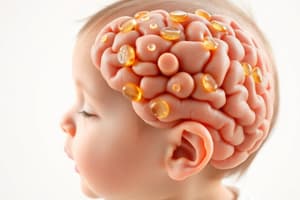Podcast
Questions and Answers
If the brain is dehydrated and broken down to its constituent nutritional content, what would it be mostly composed of?
If the brain is dehydrated and broken down to its constituent nutritional content, what would it be mostly composed of?
- Micronutrients
- Carbohydrates
- Fats (lipids) (correct)
- Proteins and amino acids
What type of fatty acids must come from our diets?
What type of fatty acids must come from our diets?
- Saturated fatty acids
- Omega 3 and 6 (correct)
- Monounsaturated fatty acids
- Trans fatty acids
What is the primary function of proteins and amino acids in the brain?
What is the primary function of proteins and amino acids in the brain?
- Antioxidant function
- Building block nutrients of growth and development (correct)
- Cell membrane creation
- Energy production
What is the result of a diet lacking a range of foods?
What is the result of a diet lacking a range of foods?
What is the primary function of micronutrients in the brain?
What is the primary function of micronutrients in the brain?
What percentage of our energy resources does the brain use?
What percentage of our energy resources does the brain use?
What is the primary source of energy for the brain?
What is the primary source of energy for the brain?
What happens when there is a drop in glucose?
What happens when there is a drop in glucose?
What are the three forms of carbohydrates?
What are the three forms of carbohydrates?
What type of fatty acids may compromise brain health when consumed long-term?
What type of fatty acids may compromise brain health when consumed long-term?
Flashcards are hidden until you start studying
Study Notes
Brain Composition
- If the brain is dehydrated and broken down to its constituent nutritional content, it would be mostly composed of fats (lipids), followed by proteins and amino acids, traces of micronutrients, and glucose.
- Fats, proteins, and amino acids have a distinct impact on brain functioning, development, mood, and energy.
Omega Fatty Acids
- Omegas 3 and 6 are essential fatty acids that must come from our diets.
- Omega-rich foods, like nuts, seeds, and fatty fish, are crucial for the creation and maintenance of cell membranes.
- Long-term consumption of other fats, like trans and saturated fats, may compromise brain health.
Proteins and Amino Acids
- Proteins and amino acids are the building block nutrients of growth and development.
- Amino acids contain the precursors to neurotransmitters, which affect mood, sleep, attentiveness, and weight.
- A diet with a range of foods helps maintain a balanced combination of brain messengers, and keeps mood from getting skewed in one direction or the other.
Micronutrients
- Micronutrients, such as antioxidants, vitamins, and minerals, are essential for brain health.
- Antioxidants in fruits and vegetables strengthen the brain to fight off free radicals.
- Vitamins B6, B12, and folic acid are necessary to prevent brain disease and mental decline.
- Trace amounts of minerals like iron, copper, zinc, and sodium are fundamental to brain health and early cognitive development.
Energy and Glucose
- The brain needs fuel, and lots of it, to efficiently transform and synthesize nutrients.
- The brain uses up to 20% of our energy resources, despite making up only 2% of our body weight.
- Glucose, or blood sugar, is the primary source of energy for the brain.
- A drop in glucose can cause a change in mental function, signaling nutrient deficiency.
Carbohydrates and Brain Function
- Carbohydrates come in three forms: starch, sugar, and fiber.
- The ratio of sugar and fiber to the whole amount affects how the body and brain respond.
- High glycemic foods, like white bread, cause a rapid release of glucose, followed by a dip in blood sugar, attention span, and mood.
- Low glycemic foods, like oats, grains, and legumes, have a slower glucose release, enabling a steadier level of attentiveness.
Brain Composition
- Brain is primarily composed of fats (lipids), followed by proteins and amino acids, with traces of micronutrients and glucose.
Omega Fatty Acids
- Omegas 3 and 6 are essential fatty acids that must be obtained through diet.
- Omega-rich foods (e.g., nuts, seeds, fatty fish) are crucial for creating and maintaining cell membranes.
- Long-term consumption of trans and saturated fats may compromise brain health.
Proteins and Amino Acids
- Proteins and amino acids are building blocks of growth and development.
- Amino acids contain precursors to neurotransmitters, affecting mood, sleep, attentiveness, and weight.
- A balanced diet with varied foods maintains balanced brain messengers, preventing mood imbalance.
Micronutrients
- Micronutrients (antioxidants, vitamins, minerals) are essential for brain health.
- Antioxidants in fruits and vegetables strengthen the brain against free radicals.
- Vitamins B6, B12, and folic acid prevent brain disease and mental decline.
- Minerals (e.g., iron, copper, zinc, sodium) are fundamental to brain health and cognitive development.
Energy and Glucose
- Brain needs fuel to transform and synthesize nutrients, using up to 20% of energy resources despite making up only 2% of body weight.
- Glucose is the primary energy source for the brain.
- A drop in glucose can cause changes in mental function, indicating nutrient deficiency.
Carbohydrates and Brain Function
- Carbohydrates come in three forms: starch, sugar, and fiber.
- Ratio of sugar and fiber affects body and brain response.
- High glycemic foods (e.g., white bread) cause rapid glucose release, followed by a dip in blood sugar, attention span, and mood.
- Low glycemic foods (e.g., oats, grains, legumes) have slower glucose release, enabling steadier attentiveness.
Studying That Suits You
Use AI to generate personalized quizzes and flashcards to suit your learning preferences.




